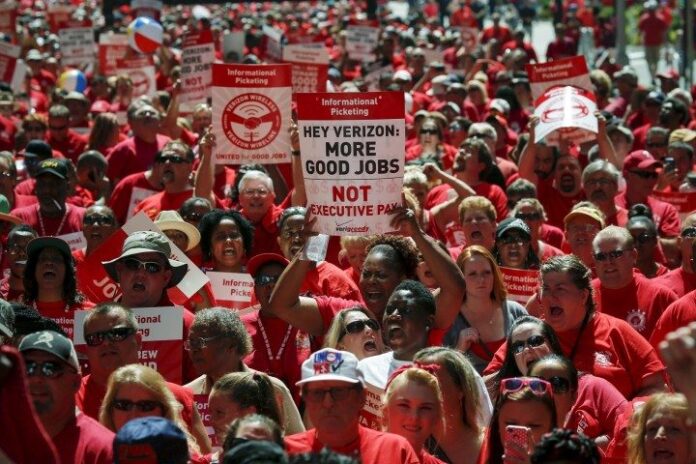After 10 months of negotiations for a new employment contract, some 36,000 Verizon unionized workers in the Northeast and Mid-Atlantic regions walked off the job at 6 a.m. this morning making good on strike threats.
The employees involved work on both the wireless and wireline sides of the business and are repped by the Communication Workers of America and the International Brotherhood of Electrical Workers.
The CWA summarized the operative labor issues as:
- Offshoring good jobs
- Outsourcing work to low-wage contractors
- Refusing to negotiate a contract with retail workers
- Call center closings
- Out-of-state assignments
The last time Verizon workers went on strike was 2011.
“It’s regrettable that union leaders have called a strike, a move that hurts all of our employees,” Marc Reed, Verizon’s chief administrative officer, said. “Since last June, we’ve worked diligently to try and reach agreements that would be good for our employees, good for our customers and make the wireline business more successful now and in the future. Unfortunately, union leaders have their own agenda rooted in the past and are ignoring today’s digital realities. Calling a strike benefits no one, and brings us no closer to resolution.”
“Millions of Americans rely on Verizon for the ability to communicate, 24 hours a day, 7 days a week,” Bob Mudge, president of Verizon’s wireline network operations, said. “We remain fully prepared to handle any work stoppage so that our products and services will be available where and when our customers need them.”
To prep for the work stoppage, Verizon said it has trained “thousands of non-union employees to fill-in for those walking a picket line,” while also readying to reassign employees from around the country to fill vacancies.
According to the carrier, impacted “duties include handling customer inquiries, inside and outside network plant management, fiber and copper network maintenance and repair, both on the ground on on our poles.”
“Since last spring, many of these employees took part in extensive network training sessions at a high-tech, custom designed business continuity training center in Northern Virginia, created especially for this potential event,” Mudge said. “They know our first priority is maintaining services for our customers and they have taken on this challenge with pride.”
According to the CWA, “Despite making record profits — $39 billion in profits over the last three years — Verizon executives have failed to fully invest in the FiOS broadband network and have been pushing to offshore jobs to the Philippines, Mexico and other locations.”
Brooklyn, N.Y.-based, 19-year Verizon tech Isaac Collazo said, “Our families and our customers deserve more from Verizon. Through our hard work, Verizon is making record profits while our families are left with threats to our jobs and our customers aren’t getting the service they need. Striking is a hardship for our families, but we need to remind Verizon executives that the people who build their profits area critical reason for the company’s success.”

